Middle schoolers from the Rochester Public Schools’ Summer of Service Program joined seniors at Cascade Creek Memory Care for a meaningful group project aimed at showing support for those impacted by the Texas floods.
“I love that I get to help people who sometimes can’t help themselves,” said Luella, a participant in the program.
Around 10 students took part in making friendship bracelets, then stayed afterward to work on puzzles and chat with residents. Each bracelet will be accompanied by a handwritten note and photos of the group in action. The project was covered by local ABC Channel 6 and you can read the full story here.
It is well known that interacting with animals can have a positive impact on an individual's emotional health and wellbeing. Most of us are familiar with therapy dogs, but have you ever hear of miniature horse therapy?
Recently, a pair of miniature horses paid a special visit to the residents of Franklin Place Memory Care in Franklin, Wisconsin. Needless to say, they were a big hit! These animal visits foster a natural connection and can even help ease some of the symptoms of dementia. Judging by the smiles all around, that’s exactly what happened.
The event was covered by the local CBS News in Milwaukee. You can watch the video here.
Emerald Place Memory Care residents in Glenview, Illinois did their part in supporting those affected by the devastating flash floods in Texas. They carefully crafted bright, meaningful friendship bracelets—each one strung with words like “hope,” “faith,” and “courage”—as heartfelt symbols of comfort and solidarity.
“Our residents really got creative with the messages and charms they added to each bracelet,” said Jennifer Boonstra, Senior Life Engagement Director at Anthem Memory Care. “Some included Bible verses, the names of their communities, and heartfelt words like ‘love’ and ‘faith.’ It was a meaningful way for them to show they care — even from miles away.”
The event was covered in the Chicago Patch. You can read the full story here.
Summer brings a special kind of joy with more time for travel, spontaneous outings, outdoor activities, and visits with family and friends. Warmer days and more flexible schedules result in more opportunities to create the kind of special moments that often turn into cherished memories lasting for years.
If you're caring for a loved one with dementia, however, you may find that these well intentioned visits can sometimes be overwhelming for them. What should be a meaningful time of connection may trigger stress or confusion. After exchanging a few light exchanges, you may find your loved one beginning to withdraw, eventually disconnecting altogether and missing out on the joy of the visit itself.
The challenge isn’t the people or the visit itself—it’s usually a matter of preparation. We all have days when our energy dips or our mood shifts. Now imagine those changes magnified and layered with memory loss. That’s often the lived experience for someone on the dementia journey.
So, what once felt like a joyful, spontaneous gathering can now feel disorienting or even frightening for a loved one who relies on routine, familiarity, and structure to feel safe and grounded.
The good news is that, with some adjustments, these visits can be more inclusive and meaningful for your loved one with dementia and for those around them as well.
Here are some tips to help optimize the value of those visits:
For individuals living with dementia, every moment that fosters a connection, sparks a memory, and empowers them with a sense of meaning brings immeasurable benefits. Living a life of purpose does not have to end with dementia. If you approach these summer visits with sensitivity and a desire to include them, your loved one can continue to connect and engage with family and friends longer. And these special moments will be remembered and cherished in years to come.
Looking for more ways to establish more meaningful visits with a loved one with dementia? Please don’t hesitate to reach out to any of our Anthem Memory Care communities. We will be happy to share some tips and help you find ways to include your loved one in a loving and meaningful way.
When the sewing group at Greenridge Place Memory Care began seeking volunteers, Lynn Hunt—an 18-year breast cancer survivor—was the first to step forward. Together with fellow residents, Lynn helped handcraft mastectomy pillows designed to bring comfort and dignity to breast cancer patients throughout the Denver metro area. These meaningful gifts will soon be delivered to Kaiser Permanente Franklin Medical Center.
“This was a deeply personal and heartfelt project for our seniors,” said Caitlin Dempster, Life Engagement Director. “They not only put their lifelong skills to use but also rediscovered a powerful sense of purpose through giving back.”
The event was covered by KUSA Channel 9. You can watch the full video here.
Residents of Chisholm Place Memory Care recently partnered with campers from Holy Cross Lutheran Church to support the many volunteers who are working to aid flood victims in Texas. The intergenerational group came together to handcraft friendship bracelets for American Red Cross Disaster Relief teams in Victoria, Texas. The effort included 10 children, ages 8 to 10, who joined residents to thank volunteers for their service and dedication.
This initiative is part of a broader effort across all 20 Anthem Memory Care communities. Each are sending handcrafted bracelets, along with photos, handwritten notes, and a card explaining the heartfelt gesture, to volunteers supporting disaster relief in Texas.
The project was covered by local KAKE TV and you can read the full story here.
Renewing wedding vows is always a special event. And the tears began to flow as Norman Corfield watched his bride of 64 years, Catherine, walk down the aisle at Emerald Place Memory Care to the sounds of a violinist playing the traditional wedding march. The Corfields were joined by Ann and Barrett Feeney, who were celebrating their 50th wedding anniversary.
For individuals living with dementia, powerful moments like this can spark a cherished memory often reflected in an instant change of expression in the face, usually in the form of a smile or a tear. This was one of those special moments, not only for the couples, but for everyone who shared it with them.
The event was covered in the Chicago Tribune. You can read the article here.
There’s something special about summer – the longer days, the warmth of the sun, and the simple joys of being outdoors. At our Anthem Memory Care communities, summer is officially in full swing. From car wash fundraisers to gardening to lively outdoor concerts, our residents and staff are once again embracing the season with open arms.
For individuals living with dementia, outdoor experiences aren’t just enjoyable, they’re healthy.
Exposure to natural sunlight helps boost vitamin D levels, which supports bone health, immune function, and even mood regulation. Fresh air improves circulation and brings vital oxygen to the brain and body, enhancing overall well-being.
But perhaps most importantly, summer means more outdoor activities which bring special moments of connection as residents recall the enjoyment of past summers. Whether it’s tapping toes to the music of an evening concert, chatting with friends on a shady porch, or simply catching some sun, these experiences foster a sense of purpose and a feeling of physical and emotional wellbeing.
And it’s not just residents who benefit. Our caregivers also find these moments refreshing and revitalizing as well. At Anthem, we believe summer should be a season of celebration, inclusion, and enrichment for everyone.
Here are just a few of the activities our residents and staff are enjoying so far this summer:
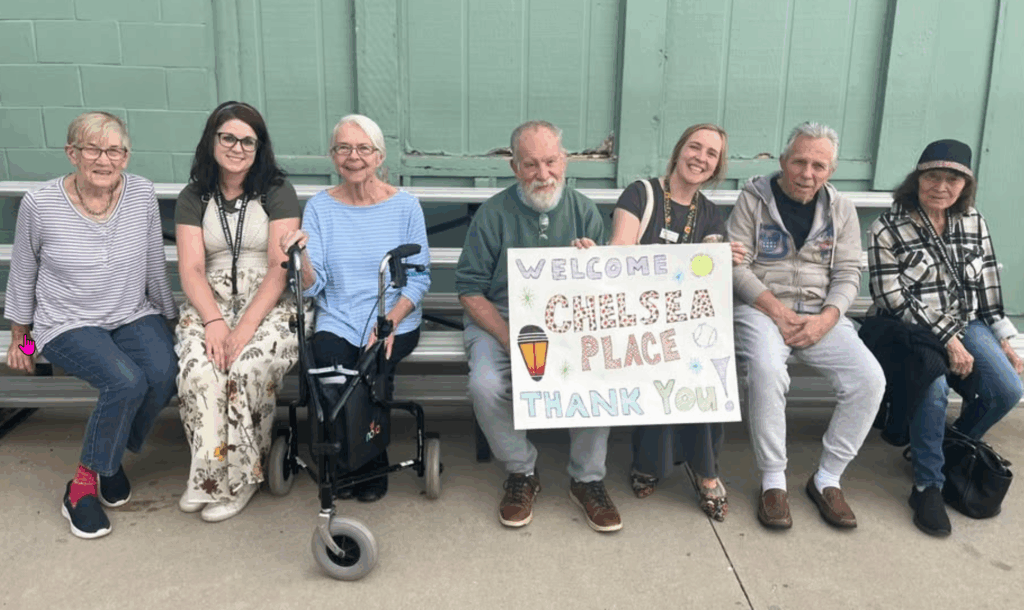
Chelsea Place Memory Care residents and staff brought snacks to their local Aurora, Colorado little league team and caught the game while they were there. The team had a poster made to thank them for being their favorite fans!
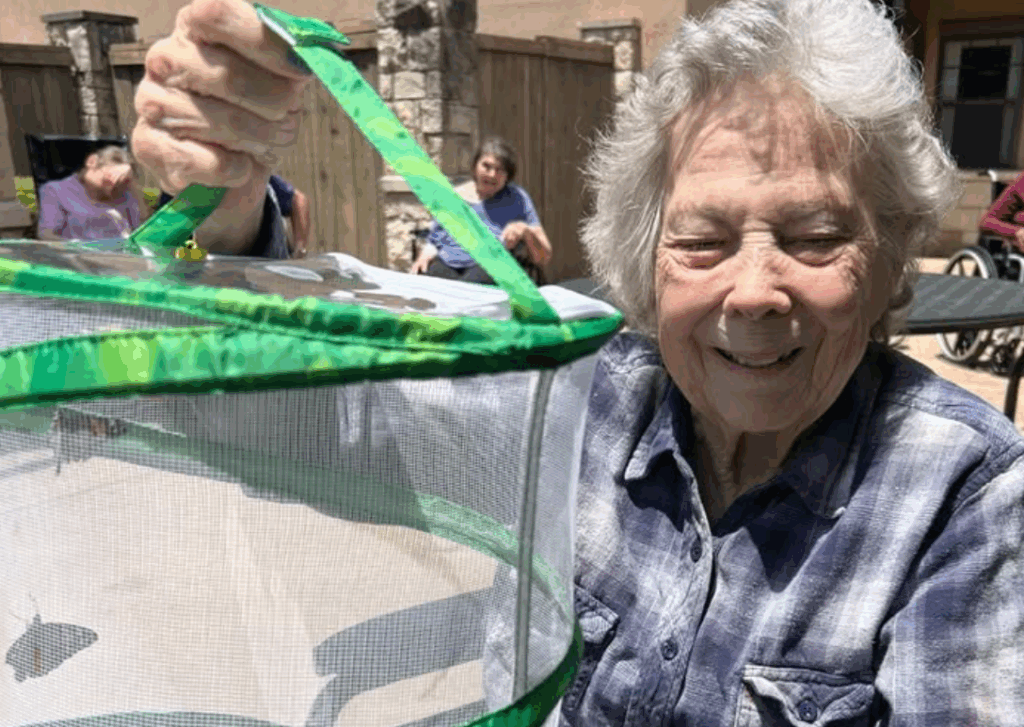
Chisholm Place residents finally released their newly metamorphosized butterflies into the Wichita, Kansas summer skies.
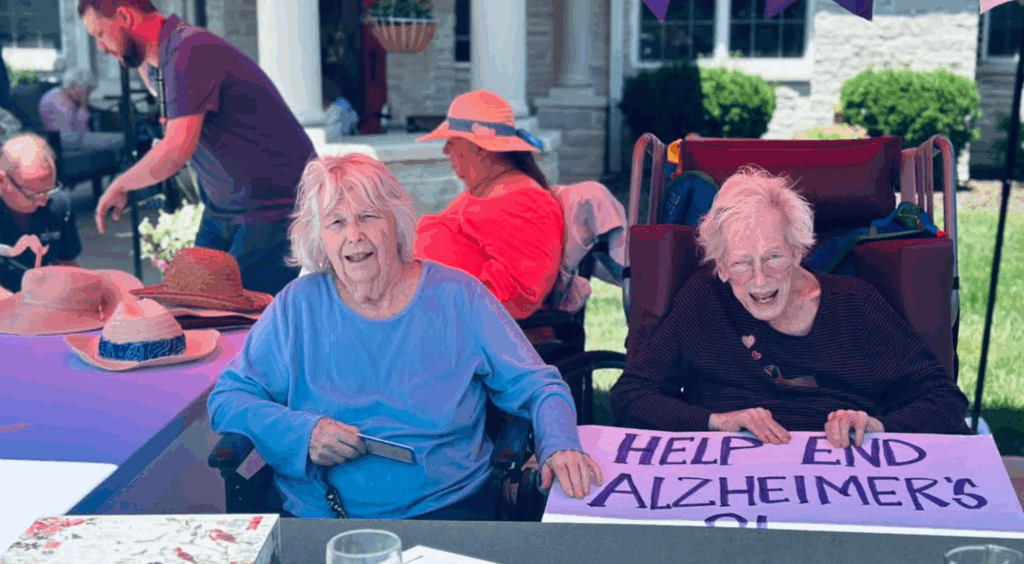
Churchill Place residents and staff organized a Longest Day Car Wash in Glen Ellyn, Illinois to raise funds for the Alzheimer’s Association.
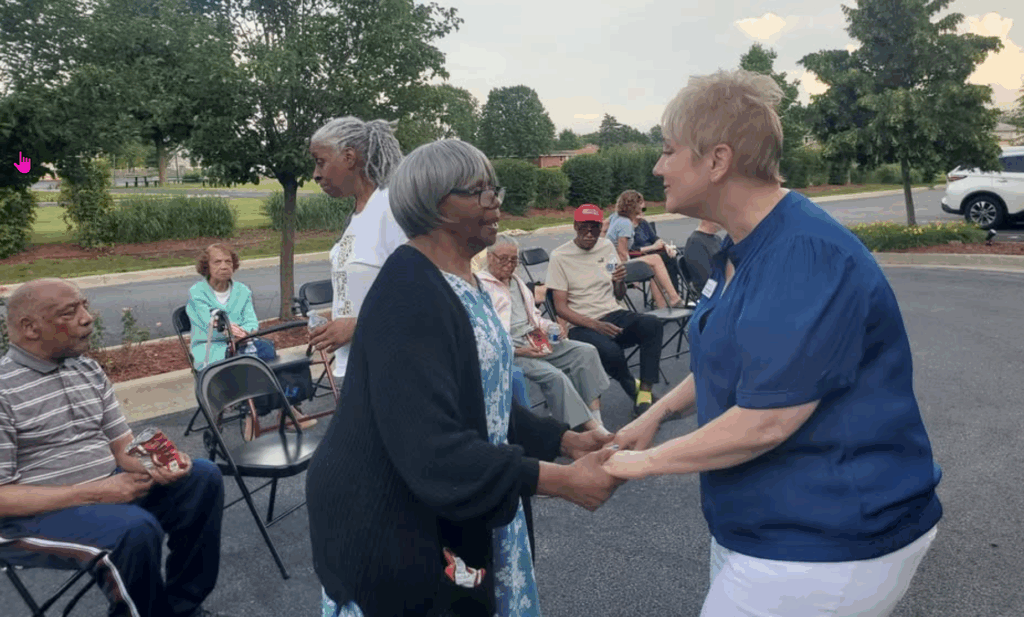
Grace Point Place held the first of many evening concerts. The music got many residents up on their feet dancing to their favorite tunes.

Harvester Place residents enjoyed early Fourth of July festivities in Burr Ridge, Illinois. “Uncle Sam” looks pretty good!
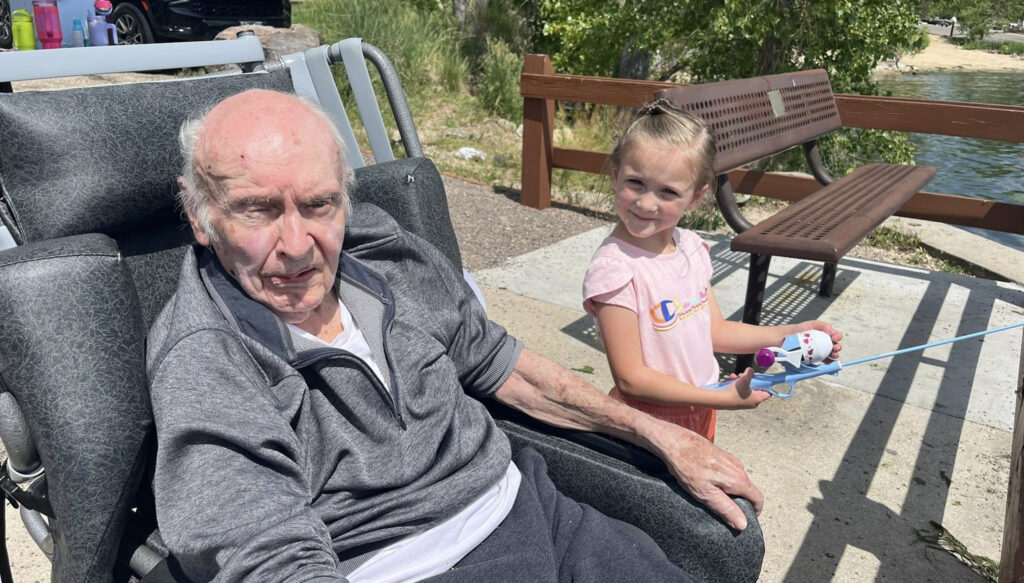
Bob Harlan, resident of Chelsea Place recently shared his lifelong passion for fishing with his great-granddaughters during a special fishing trip in Littleton, Colorado with fellow residents.
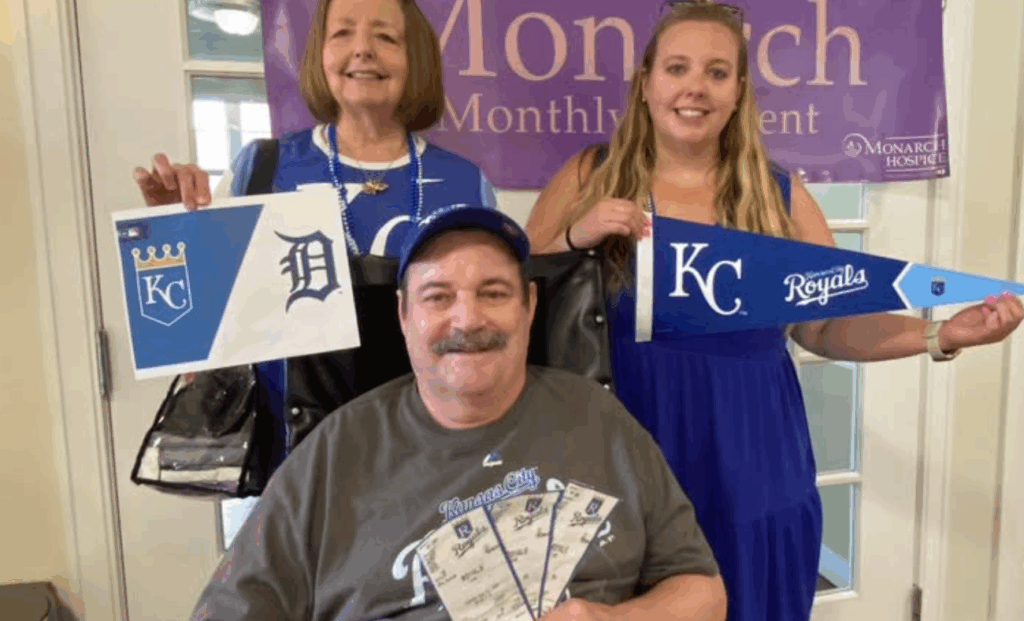
This Morningside Place resident Royals fan was gifted with tickets to a game. The look on his face says it all!
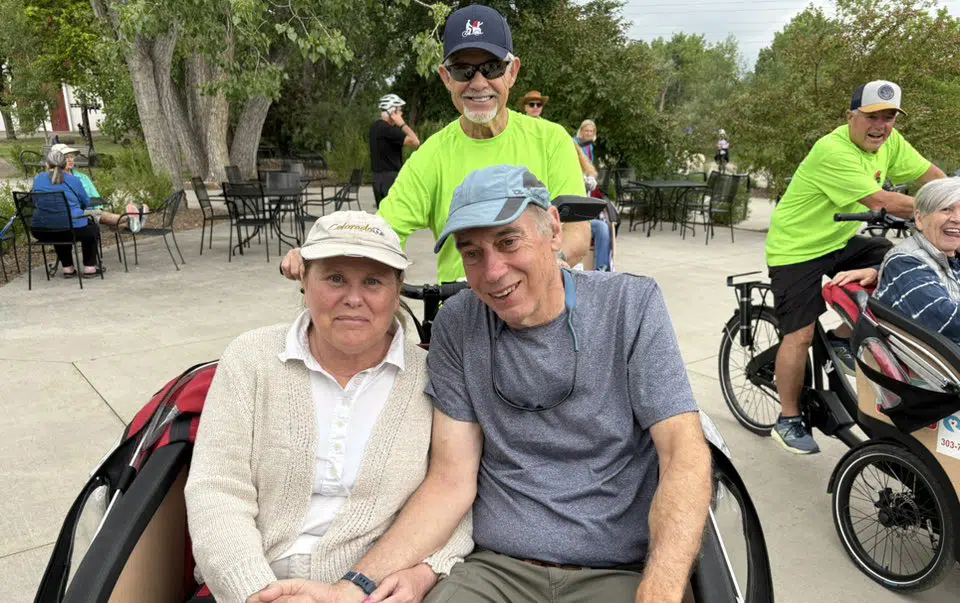
Residents of Highline Place in Littleton, Colorado kicked off summer with a fun bike ride thanks to a group of dedicated volunteer cyclists. They had a blast enjoying a scenic rickshaw ride through Hudson Gardens.
How is your summer shaping up?
If you are caring for a loved one with dementia, consider finding ways to share your outings and family get togethers with them. A little preparation and an open mind can go a long way towards making your summer activities more inclusive and enriching for everyone.
Looking for ideas? Please feel free to reach out to any of our Anthem Memory Care communities. Our life enrichment team will be glad to share some tips and resources to help you and your family enjoy more fun activities together.
(Anyone who has ever enjoyed a Bomb Pop will appreciate our header image of Morningside Place residents taking an afternoon drive with these refreshing popsicles!)
At Savoy Place Memory Care in Savoy, Illinois, volunteers like local artist Lori Fuller are making a meaningful impact. Each week, Lori shares her artwork and music through interactive “show and tell” sessions that foster connection, spark memories, and inspire joy among residents.
“There’s just that whole sense of wonder that comes with looking at art,” Lori told local news station WCIA, which recently featured one of her sessions. “I just really love it.”
You can learn more about Lori’s inspiring journey and the impact of this unique art program in the WCIA video.
Caring for a loved one with dementia presents profound day-to-day challenges. It’s a life-changing journey, not just for the person diagnosed, but for the caregiver as well. While there are many resources available to provide support, nothing can fully prepare the caregiver for the emotional, physical, and mental demands that lie ahead.
Family caregivers often describe feeling helpless as they navigate days filled with confusion and unpredictability. The early stages can be particularly difficult, as routines are still being established and family caregivers frequently feel unprepared for the challenges that lie ahead. This is where journaling can help.
Journaling provides both practical and emotional support for family caregivers.
On a practical level, journaling helps bring structure to each day. By recording a loved one’s daily challenges along with observations and solutions, caregivers can gain valuable insights that foster a greater sense of control and preparedness.
First, the practical support: Here are three areas of focus for journaling your loved one’s daily life:
The notes you take can be shared with your loved one’s doctors and therapists to optimize your ongoing care.
But the true power of journaling for caregivers lies in the emotional release it offers.
Journaling provides a healthy way to process tough days, reflect on small victories, and celebrate moments of joy, offering comfort and clarity in a deeply personal, meaningful way.
Studies have found that writing for as little as 15 minutes a few times a week can significantly enhance emotional well-being and reduce symptoms of depression. Putting thoughts and feelings into words can offer relief, helping caregivers process the emotional weight of their experience and feel less alone in their journey.
Here are five powerful ways journaling can help you deal with stress and find moments of joy:
Journaling is a lifeline for so many family caregivers. Why not start your journal today?
In the midst of the uncertainty and emotional weight that comes with caregiving, journaling offers both clarity and comfort. It’s a small, highly accessible activity that can make a meaningful difference by helping you stay grounded, better support your loved one, and take care of your own well-being in the process.
While the road ahead may be challenging, no caregiver should have to walk it alone. A pen and a notebook (or laptop) is the first step toward feeling more supported, understood, and empowered. Other steps include reaching out to close family members and friends. Consider joining a dementia support group. These groups are led by licensed professional therapists and bring family caregivers together to share experiences and lend each other support.
Finally, feel free to reach out to any of our Anthem Memory Care communities. We are always ready to lend an ear, answer your questions and to help you find the resources you need on your caregiving journey.
Residents of Highline Place Memory Care in Littleton, Colorado kicked off summer with a fun bike ride thanks to a group of dedicated volunteer cyclists. They had a blast enjoying a scenic rickshaw ride through Hudson Gardens, courtesy of Cycling Without Age.
The program’s mission is to help older adults reconnect with the joy of cycling, promote mobility, and create meaningful moments in the great outdoors. And it works!
The event was covered by Argentum and you can read the full article here.
Summer is here, bringing with it countless opportunities to soak up the sunshine and enjoy favorite seasonal activities. From picnics in the park and leisurely strolls to cookouts and pool parties, every family has their own special summer traditions.
For families with a loved one who has dementia, however, these moments may bring mixed emotions. A parent, spouse or other family member who once eagerly participated in these gatherings may now find it difficult to engage as they once did. So, while the desire to participate may still be there, the pace, noise, and unpredictability of summer events can quickly become overwhelming, triggering confusion, fear, and anxiety.
Does that mean you need to leave them out of your summer activities? Absolutely not! While the level of support needed will vary depending on the stage of their dementia, with a little planning and sensitivity to their needs, your loved one can safely share in the joys of summer in ways that are tailored to meet their unique needs.
Here are some tips to help you pave the way towards a safe, healthy, and enjoyable summer for your loved one:
Here are some summer activities to consider that offer natural opportunities to connect, engage, and enjoy time together:
Summer is a wonderful time of year to relax and reconnect with family and friends. Individuals with dementia who are able and willing to participate can gain the benefits of these connections along with the sense of empowerment that comes from being able to join in on summer activities they’ve enjoyed throughout their lives.
Looking for more ideas and tips? Feel free to reach out to any of our Anthem Memory Care communities. Our life enrichment team will be happy to share some of our favorite summer outing ideas with you.
Scott Hudson and his 23-year-old daughter, Lindsay Hudson, have been dedicated volunteers with The Rosary Team for over two years, leading the rosary for residents at Greenridge Place Memory Care in Westminster, Colorado. What started as a personal calling to serve has grown into a deeply meaningful ministry. And it’s one that enriches the lives of the residents they visit while strengthening their own faith and bond as father and daughter.
The Denver Catholic News has written a wonderful article about Scott and Lindsay and their work at Greenridge Place. You can read more about them and their spiritual journey here.
Concord Place Memory Care in Knoxville, Tennessee found a heartfelt way to celebrate Father’s Day by creating new memories. Each of the dads were photographed holding meaningful personal items, each chosen to reflect the essence of fatherhood.
From a well-worn watch to a compass, a cherished Bible, or a favorite hat, each object told a story of strength, guidance, faith, and love.
The photo session was covered in the Knoxville Patch. You can read the full story here.
Families with loved ones who have been diagnosed with dementia naturally seek ways to keep them in their homes for as long as possible. They feel that the familiar surroundings are more comforting to their loved one. After all, a house full of memories helps preserve that special connection to the past. And, given the uncertainty of the journey ahead, knowing their loved one is safe and sound in their own home is understandable.
But are they truly safe and sound?
As dementia progresses, it can significantly affect both cognitive function and mobility. While keeping a loved one at home may feel comforting, it may come at the cost of their safety and well-being. Everyday items that once seemed harmless—like a bathroom rug, stone patio steps, the kitchen stove that cooked so many family meals, or a cherished collection of glass ornaments—can quickly become serious hazards. Recognizing these risks is an important first step in ensuring a familiar, yet safe, environment.
The AFA (Alzheimer’s Foundation of America) and the National Institute on Aging have put together insights and tips on making a home safer and more dementia friendly. We’ve re-grouped some of their key tips into four areas and summarized them as follows:
Physical safety
Cognition aids
Personal comfort
Emotional support
Following these tips will help make your loved one’s home safer and more dementia friendly, easing their daily routines and giving your family greater peace of mind, especially when you can’t be there. It is also important to recognize that there may come a time when their cognitive and physical decline progresses beyond what can be managed at home, even with your best efforts. When that time comes, seeking professional memory care becomes not just necessary, but essential for their safety and well-being.
We encourage you to reach out to any of our Anthem Memory Care communities for additional tips and resources to help you improve the quality of life for your loved one and your family as you take this journey together. We are always ready to help!